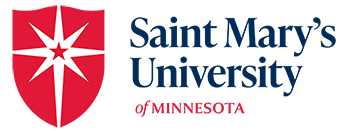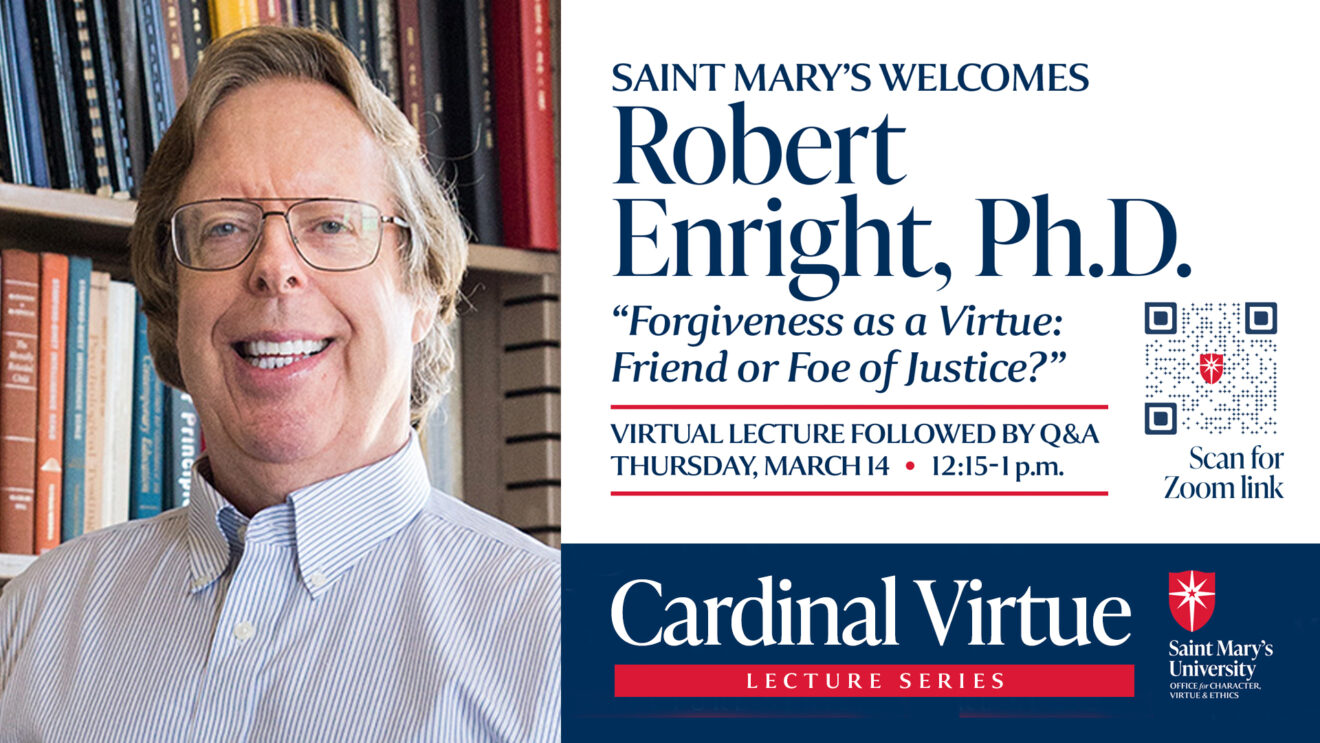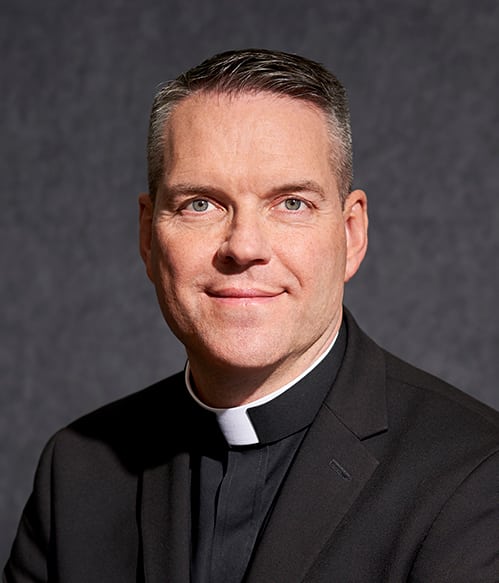Saint Mary's Newsroom
Campus ConnectionAn update from the president to alumni and parents
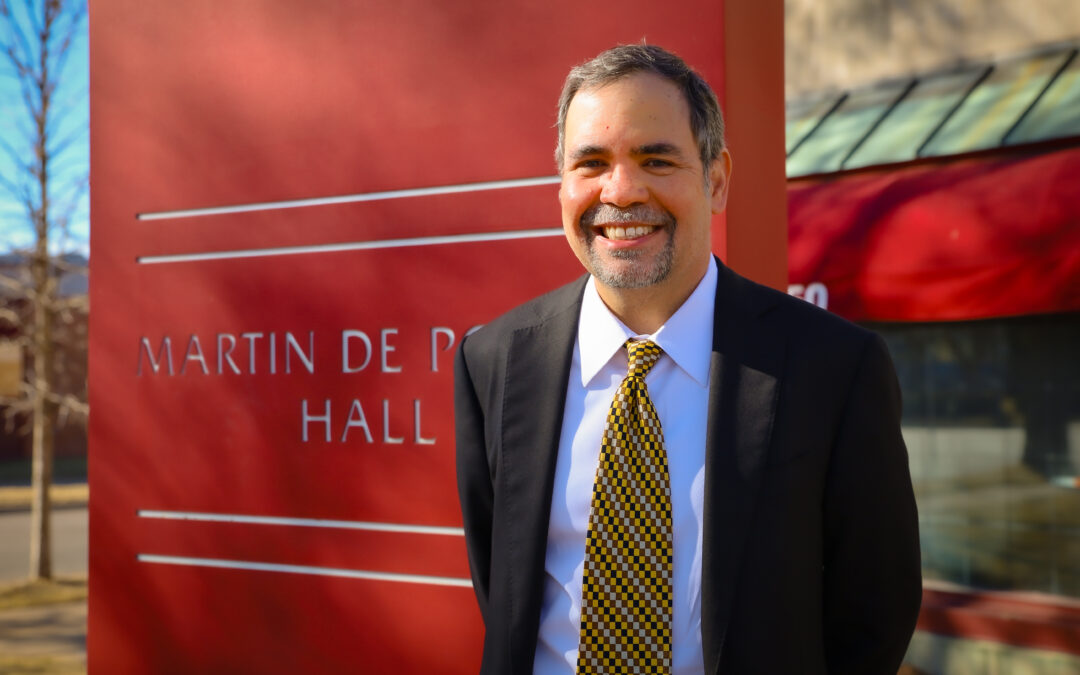
Introducing Fernando Bucaro, Saint Mary’s chief financial officer
The Saint Mary’s community is pleased to welcome Fernando Bucaro as the new chief financial officer. Bucaro has been serving in the role since Feb. 19. Below is a Q&A meant to introduce Bucaro to the Saint Mary’s community:
Q: What was your professional history prior to arriving at Saint Mary’s?
Bucaro: I have 30 years of experience in the finance field. I started my career at what I like to call “small local companies,” which include Cargill, General Mills, and Carlson. Some of my first positions were in IT, believe it or not. However, I slowly started moving towards numbers because I had a passion for finance and accounting. I spent the first six years or so in internal audits at Cargill, General Mills, and Carlson. After that, I moved more towards what I would call “hardcore finance” and did merger and acquisitions work with Carlson. After spending 20 years in corporate America, I decided to shift over to higher education and began working at the University of Minnesota as the finance director for their research function there. They’re responsible for what’s turning out to be a nearly $1 billion research arm of the university, not only managing their operational budget but also having responsibility for some of their grants, as well as the management of the sponsor projects at a high level.
Q: What made you interested in working in finance and accounting?
Bucaro: I like to utilize numbers to tell stories and set the direction of an organization so it can move forward into the future.
Q: What made you interested in the position at Saint Mary’s?
Bucaro: I have two daughters, and I saw their development through a Lasallian Catholic education at the high school level. I deeply believe it’s an opportunity to help out a younger generation. I do see a gap in our world today, and I believe we can help develop young leaders who are well-rounded and really want to help out their communities, as well as have personal success.
Q: As you settle in at Saint Mary’s, what part of your experience are you most excited to bring to the table?
Bucaro: For me, it’s strategic thinking and long-range planning. This is something I always go back to and bring up in conversations I have with people: there is a difference between finance and accounting. Accounting tells us a story of what’s happened, and sometimes organizations are too focused on that. We need to focus also on what we can do going forward. And to do that, we have to set a strategy to have a financially sound future.
Q: How do you envision integrating the values and mission of our Lasallian Catholic identity into your work?
Bucaro: Every company, and while Saint Mary’s isn’t a company, has a mission and vision to put the customer first, and at Saint Mary’s, our customers are our students. We want to make sure we’re making the right decisions for them strategically and financially, but more importantly, our goal should be to provide them with a sound education that builds their careers going forward. So it’s bringing that into my work and realizing it’s not about a stock price, it’s about our students.
Q: What are some of your initial thoughts of Saint Mary’s?
Bucaro: I’ve seen a significant amount of commitment from staff, faculty, administrators, and trustees. There is a commitment and friendship among most people that makes working and doing your job a lot more comfortable. And their commitment is all for our students.
Q: Higher education is always evolving, are there any strategies you have in mind to keep us ahead of the curve?
Bucaro: I think the challenge we face is how we continue to develop things that set us apart from our competitors. How do we create new programs, new initiatives, and things of that nature? One thing that made Saint Mary’s great was launching our professional programs. I look forward to finding that next initiative that makes us say, ‘Wow, we can lay our foundation on this for the next 20 years,’ which is what we did with our professional programs.
Q: Can you tell us a bit about who Fernando Bucaro is outside of your professional setting?
Bucaro: Well, I have two daughters who are 21 and 18. My oldest is at the School of Foreign Service at Georgetown and my youngest is a senior at Benilde-Saint Margaret’s High School. My wife, Pamela, is an ophthalmologist here in the Twin Cities area. I’m originally from Guatemala and began learning English at the age of four and subsequently moved to the U.S. when I was 10. I received most of my education here in Minnesota, receiving my undergrad at Saint Cloud State and an MBA from Saint Thomas. I also ventured out a bit and did a Master’s at Oxford University, which is a completely different educational process and environment. I speak several languages, including Spanish and Portuguese. My wife Pamela and I are passionate about world travel and have visited over 80 countries in the world.
Saint Mary’s University holds annual Spring Concert March 17
The Saint Mary’s University Concert Band, Concert Choir, and IHM Schola will present this year’s Spring Concert, titled “This is the Day,” on Sunday, March 17, at 4 p.m. at the Chapel of Saint Mary of the Angels, 1155 W. Wabasha Street, Winona.
Directed by Nathan Herr, interim director of music programming, this year’s concert features Irish music, such as Red is the Rose and County Derry, as well as Sacred Music honoring the Catholic tradition of Saint Mary’s, such as Ave Maria (Angelus Domini) and Nearer, My God, To Thee.
Admission is free and open to the public. For more information, please contact Saint Mary’s University Event Services at eventservices@smumn.edu.
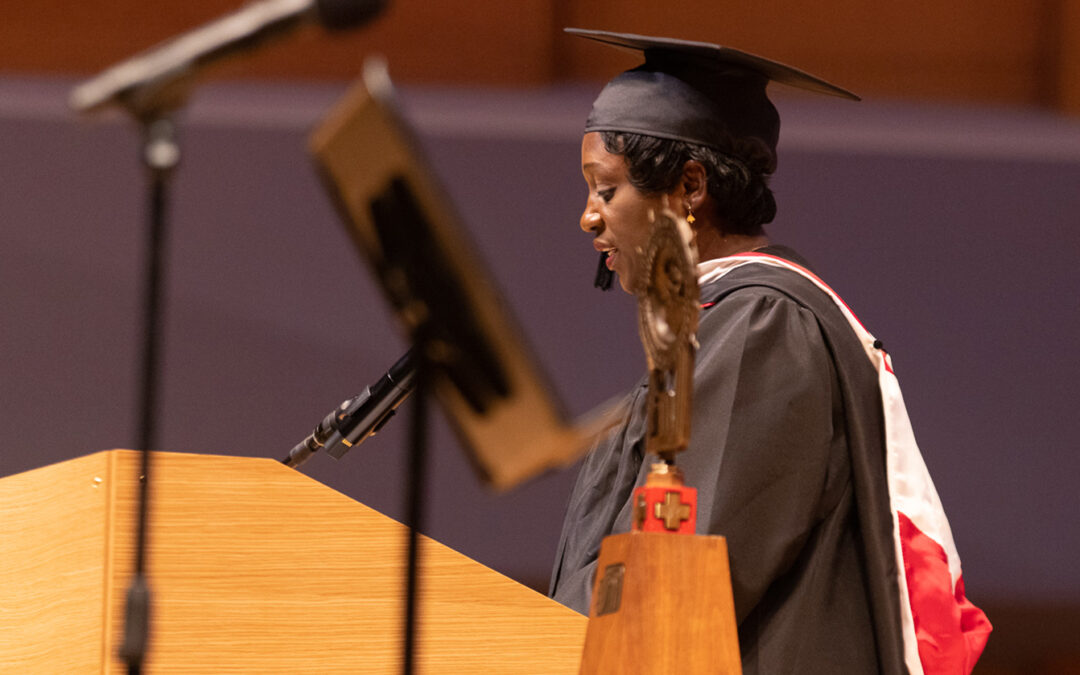
Reindorf advocates for racial equality and inclusion
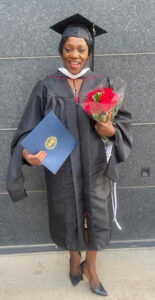 When faced with adversity, Roberta Reindorf B’14, M’23 finds strength in the quotes she hangs on her office walls — quotes from African American role models like Michelle Obama, who once said, “You can’t make decisions based on fear and the possibility of what might happen.”
When faced with adversity, Roberta Reindorf B’14, M’23 finds strength in the quotes she hangs on her office walls — quotes from African American role models like Michelle Obama, who once said, “You can’t make decisions based on fear and the possibility of what might happen.”
Or Michael Jordan, who said, “I failed over and over and over again, which is why I succeeded.”
As an immigrant, Reindorf has overcome numerous obstacles in her educational journey, and along the way, she’s suffered great personal loss, but — inspired by her faith, her family, a desire to help others, and the help she received from Saint Mary’s University, she persevered.
In June 2023, she earned her latest degree from Saint Mary’s, a master’s in Counseling and Psychological Services. She also has a bachelor’s in Human Resource Management. Now, she says, she’s considering a doctorate.
A native of West Africa, her family moved to London when she was a teenager, and then as a young adult she immigrated to the United States to further pursue her education … in vascular surgery.
Looking back, she said, she didn’t understand all the steps that would need to occur before she could even begin her studies in a new country, one with a very different educational system. And, she needed to uncover her true calling in life.
She also focused on family. She met her husband, a U.S. citizen, and they raised two children.
It was her father-in-law, who was a clergyman in downtown Minneapolis, who persuaded her to investigate Saint Mary’s, knowing she had been looking for a place where she would feel like she belonged. After learning how many immigrants were successfully studying at Saint Mary’s — and learning more about its affordability in comparison to other schools — she applied. “It became a second home for me,” she said.
In her June commencement speech, she said, “After many difficulties in transferring my previous educational background … Saint Mary’s worked with me to find a pathway forward.”
She also detailed the pain of losing her mother and her sister while enrolled and described how then program director Mary Louise Wise advised her to take time off to grieve and focus on her mental health.
But, just as she was returning to her courses, COVID-19 struck, throwing obstacles in the path of education around the globe. And, with one final blow, in 2021, just after returning to her studies again, her husband died.
“I decided to advocate for myself, so I persevered,” Reindorf told the June Saint Mary’s Minneapolis commencement audience. “I began to see the big picture of what got me on this journey in the first place. (Program director) Dr. Lindsey Tiegland … in her warm, beautiful voice said to me, ‘You can do it. You are capable of completing it. Yes, you can do this.’ ”
Reindorf is now using her education, her skills, and her background to make a difference in the world. She is currently a children’s mental health practitioner for Ramsey County, serves on the Race Equality Advisory Council of Hennepin County, and runs a television interview show — all of which have provided her an opportunity to advocate for racial equality and inclusion in Minneapolis.
“I see lots of immigrants struggling to transition and navigate the American system, trying to get an education,” she said. “I see a gap, where I am able to use my background and skills, and I’m just getting started on advocating for policies that continue to improve services in our communities.
“I go in with a lens of inclusivity,” she added, “making sure we understand that demographics are changing.”
In her work with the Race Equality Advisory Council, she conducts research, which may find its way into policy change. “I want to make sure children have access to mental health services but also equitable mental health services,” she said. “There are so many educational and mental health inequities. I present my findings to the commission and to the board, which is then presented to the Hennepin County Commissioners,” she said.
Guests on her show, “The Roberta Reindorf Show,” featured on Northwest Community Television Channel 12 (now CCXMedia), are frequently those in political office. “It’s also a platform to shape policies,” she said. “I have interviewed lawmakers, senators, representatives, from both parties, including the minority speaker of the House, whom I interviewed on mental health policies and gun violence,” she said.
Where she sees problems, Reindorf wants to be a conduit of change.
“I have not yet accomplished what I want to do,” she said. If given the opportunity, I’m going to make a big impact on the lives of Blacks, immigrants, or others who have come to the United States and wonder, ‘Where do I go from here?’ ”
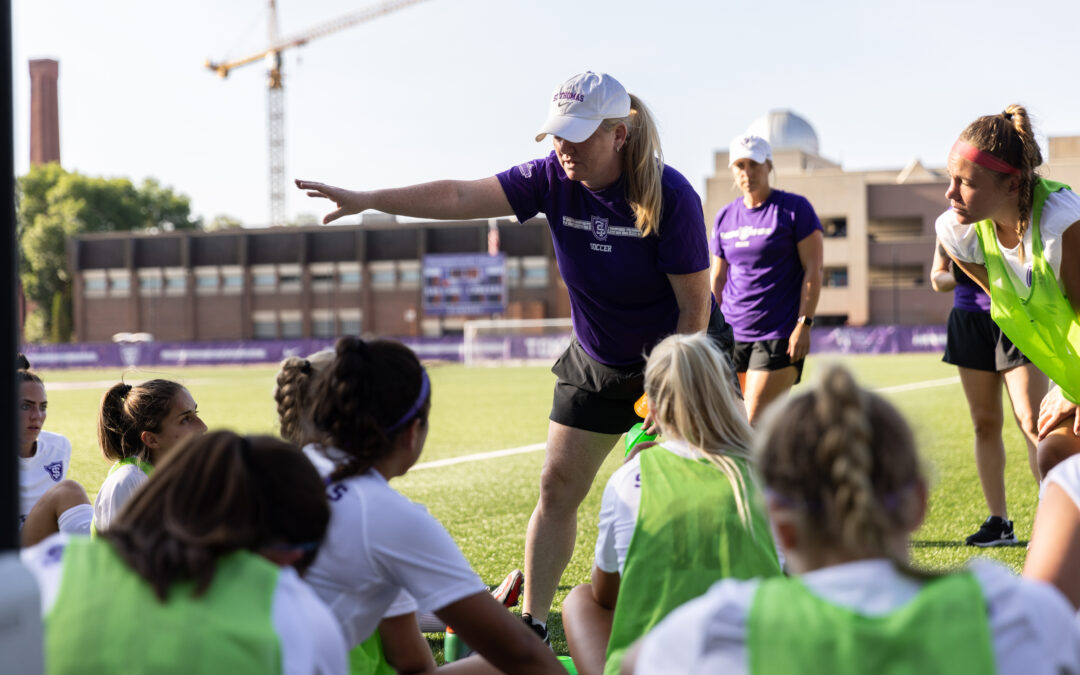
Juggling multiple balls
Soccer coach McGill finds work, home-life balance
Sheila (Hannon) McGill B’97 has coached women’s soccer for the University of St. Thomas for 17 years.
She’s also the mom of five.
The fact that she’s been able to do both roles, simultaneously and successfully, is a point of pride.
“Those combinations don’t happen,” she said. “The biggest thing is that longevity. I’m doing something not a lot of women who are mothers, especially with five children, are able to do and be successful in a predominantly male world. Glass ceilings are there for women, and they’re hard to get through. I’ve had the benefit of having supportive people in my life.”
McGill first credits her family, including her husband, who, she admits with a laugh, has become a really good cook during her fall season. She also credits her children, who have been not only forgiving, but also supportive.
“There have been times during the season that I’ve felt like I was letting my family down, but my kids actually lift me up,” she said.
“Be forgiving of yourself,” she said. “Know that no one is superhuman. You can’t always balance it all. You’re going to have to prioritize. My family is my priority, and to me that’s the right priority, but also — it was able to be done. It comes down to your support system. And that also has to do with your business. Do you have the support there too?”
For example, McGill said her youngest “happy surprise” child was born a week before the start of that soccer season, back before maternity leave.
Nervously, she went to the athletic director and said, “I need to have a talk with you.” “(After I told him), he leaned back and said, ‘Oh thank God, I thought you were quitting!’ It was the best response he could have given me.”
Yet again, she said, with the help of her support team, she navigated taking care of a newborn while coaching. Her husband diligently brought the baby back and forth to practices so she could nurse on schedule.
“Having that support is key,” she said. “It’s about getting more people on board to support women in trying to be a mother and a successful woman in their fields.”
McGill knows that in addition to teaching her athletes competitive skills, she’s also teaching them leadership skills they’ll need throughout their future.
“They’re all going to be successful career women outside of soccer,” she said. “I try to show them how to have a difficult conversation with someone without getting too emotional or working backwards. How can we be problem solvers moving forward? Some of my former players, now working at Drake Medical and Medtronic, for example, have reached back and said things like, ‘You really helped me successfully navigate this world.’ ”
There are challenges, McGill admits, to being a woman in leadership who works with women.
“They want you to be their best friend, their confidant, a little bit their mom too, as well as a professional making difficult decisions,” she said. “You have to have a thick skin, and you have to be able to let things roll off your back. Keep the picture you are trying to achieve in front of you. And try to be a positive person who keeps things moving in the same direction with that target in mind. I love surrounding myself with other strong women who are collaborative with me, women who have the same values and vision.”
McGill used these skills as she transitioned from Division III to Division I in 2021. “I think it’s about keeping a positive mentality. If you act or seem scared, a team can feel that coming off of a coach,” she said. “We had team meetings and talked about Division III upperclassmen working with Division I underclassmen. We talked about the type of people they wanted to be and the legacy they would want to leave. They already had the knowledge they needed. They knew how to play college soccer.”
For example, she says proudly, “Our last season before we left Division III, we were one penalty kick shootout away from the Final 4.”
Beyond this exciting season, McGill has acquired a number of accolades during her career. She coached her 300th game at St. Thomas early this season, which was her 25th in college soccer as a player, assistant or head coach. She has the longest tenure at her school of the nine Summit League women’s soccer head coaches.
A former MIAC soccer player at Saint Mary’s from 1993-97, McGill was an assistant coach at St. Catherine University from 2003-06. She also coached at Cretin-Derham Hall High School, White Bear Lake’s youth soccer program, and for U.S. Youth Soccer National League Region II and the State of Minnesota in the Olympic Development Program. She’s been named MIAC Coach of the Year in 2008, 2018, and 2019.
She tells young women hoping to coach at a Division I level, “Get your license and be the one who is qualified, get experience, find yourself a good mentor. Get that experience, even if it means volunteering at first, and don’t be afraid of feedback. We all get feedback and the claws come out, and then you retract the claws, and take a deep breath, and see if you can find something useful in that feedback, something that can make you a better coach.
“It’s also about self reflection,” she said. “Every time we have successes and failures, we reflect on the ‘whys’. We do a collaborative reflection after every practice and every game. Did we make the right decisions? There are times when the answers are ‘yes’ and ‘no.’ ”
McGill agrees women are often toughest on themselves, and the proof is in the applications she sees. “When I’ve been searching for an assistant coach, I’ve seen men who are completely unqualified but take a chance and apply. But every woman who applies is qualified. They have everything I need on their résumés.”
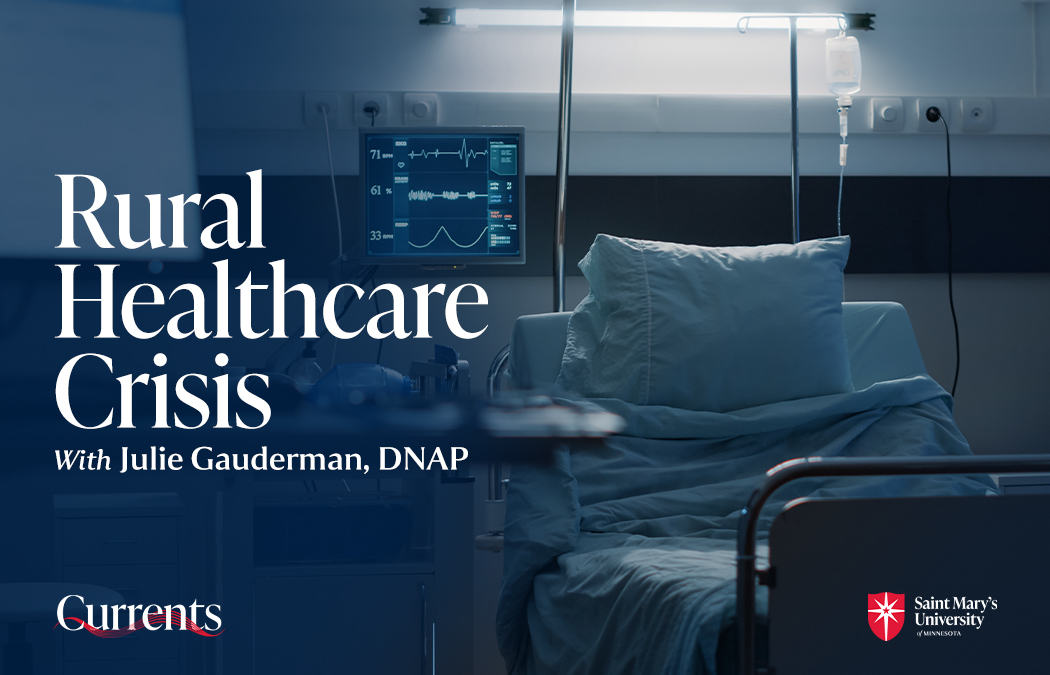
Gauderman discusses rural healthcare on Saint Mary’s Currents
The recent closure of the labor and delivery unit at Fosston Hospital in northern Minnesota has raised numerous concerns about the healthcare crisis across rural Minnesota and the U.S.
With reports that more than half of the hospitals in the nation are no longer offering maternity care, and with the 2022 Minnesota Department of Health findings showing a severe shortage of health practitioners of all types in our state, we turn to one of our experts at Saint Mary’s University of Minnesota to share her perspective on this alarming issue.
In this episode of Saint Mary’s Currents, we sit down with Julie Gauderman, DNAP, associate director of the nurse anesthesia program, and discuss the healthcare crisis’ impact on practitioners, patients, and communities.
Listen Here:
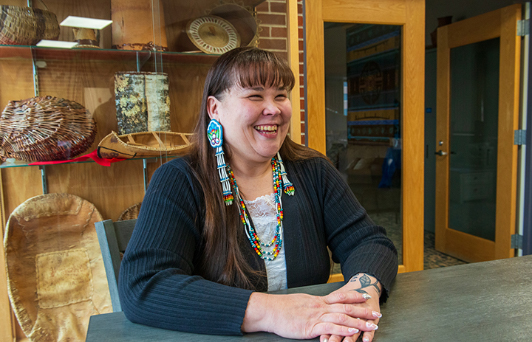
Changing the future of education
Downwind advocates for marginalized students
Chrissy (Koch) Downwind M’17 admits she doesn’t sugarcoat. “When I introduce myself, I usually include the fact that I don’t have a filter,” she says with a laugh.
So when Downwind is asked how women go about breaking glass ceilings in their workplaces, she simply says, “Walk around with a big hammer.”
Downwind, who is Ojibwa and Lakota, shattered one glass ceiling after she was named vice president for American Indian student success and campus diversity officer for Bemidji State University (BSU) and Northwest Technical College (NTC) in April 2023.
She became the first American Indian woman to hold a vice president position at a four-year university campus for the Minnesota State system of colleges and universities. In her previous role as executive director of the American Indian Resource Center for both BSU and NTC, she was also the first woman to hold that position.
“As a marginalized woman working in a male gender-based role, I’m not quiet,” she says. As an advocate for her students, she can’t be.
Downwind believes she got a lot of her spirit from her father, and the work that she’s doing is a continuation of the legacy he started.
“Through and through, I’m a daddy’s girl,” she said. “Dad lived a pretty rough lifestyle until I was born, and then he decided, when I was in the third grade and he was in his 40s, that he was going to change the trajectory of how life looked for my family and go back to college.”
It wasn’t easy. Downwind said she remembers watching him struggle to raise his family, work full time, and go to school. “I not only watched my dad get his degrees but also start working for St. Cloud State. I watched him pioneer his way through the MNSCU system (at that time) to be the founder for the American Indian Center at St. Cloud State.” Though her father suffered from medical conditions and could not continue his work, a seed was planted in Downwind when she was young to help others.
After she got her bachelor’s degree, she began working in a K-12 setting. “I was making a difference and I loved working with my students,” she said. “My students consisted of high-need traumatized, marginalized students in a public school setting. I connected with them and loved my work.”
She never considered leaving that position and working in higher education. In fact, Downwind said the main reason she came to enroll at Saint Mary’s Master of Arts in Educational Leadership was almost entirely because she was dared by a friend.
“I don’t back out of a challenge,” she said, admitting that 13 years after getting her bachelor’s degree, she wasn’t sure she had made the right decision. Online education was completely new territory.
Yet, Downwind said she received the support she needed to be successful. “The faculty were so open and willing to help,” she said. “I have nothing but love for Saint Mary’s and what it did for me, giving me the energy and the knowledge I needed to continue moving forward. It was so easy and so smooth, and to have that in an institution, especially when you do it online … To this day, I recommend Saint Mary’s. I owe a lot to Saint Mary’s for where I am today.”
It was her cohorts who first suggested she move into higher education. Downwind said she associated higher education with people in suits, speaking academic jargon, and usually uptight.
“I figured, that’s not me,” she said. “And I wasn’t going to change myself to fulfill that narrative.”
But when Downwind felt her current job in public schools was going stagnant, and a position opened at the American Indian Center at BSU, she applied and was hired in July 2019. In her second week, her superior, the executive director of the center resigned, and Downwind instinctively picked up the slack. Because she showed such initiative, she was encouraged by several at BSU to apply for the executive director position.
“I never saw myself in that leadership role,” she said. “I didn’t have that confidence to move forward without a nudge. A lot more people had confidence in me than I did in myself.”
During this same timeframe, BSU was facing a crisis with hate crimes and racial speech. “Our students didn’t feel safe and like their voices weren’t being heard,” she said. “When those students came to me, I saw the despair on their faces. As a marginalized woman, I grew up in a society where I fought all of those things.
“I was an alumna of BSU 20 years ago, and I faced and dealt with the same marginalized oppression and racial discrimination that our students face today,” she said.
In her short tenure, Downwind and her team have grown American Indian enrollment from a low of just over 200 students to 430. Now, they are focused on retention.
She also is running the Nisidotaading (pronounced “nisi-do-tah-ding”) program for the Minnesota State chancellor’s office, housed at BSU. This initiative, named for an Ojibwe phrase which means “having a mutual understanding,” will help to ensure that BSU students across all disciplines graduate with an opportunity to develop an understanding of Indigenous peoples and cultures and the issues they face.
Her goal is to provide culturally fluent professional development and training for faculty and staff, first at BSU and then across the Minnesota State System. “We’re changing the future. I feel like my father’s work has come full circle,” she said.
Downwind is proud that her sons, and now her granddaughter, are seeing their mom and grandmother break barriers. “I don’t want my granddaughter to experience the same issues (as a woman and as an American Indian) that I did,” she said. “Women look at things like a mother, seeing how things are affecting students. As caregivers, it’s inherent. When women empower one another, those ceilings are going to start shattering.”
Photo by Eric Sorenson
Updates to Career Services website
Nearly six years ago, a microsite was built for the university’s Career Services department. Prior to that, the department had a page housed under the school’s main website to showcase its services to students. To show the breadth and depth of what Career Services had to offer, a separate microsite with over 20 pages of helpful content was implemented. Over time, however, resources, content, employers, and internship opportunities would become outdated, making it increasingly difficult to upkeep manually. A strategic move was made to purchase a new platform called uConnect, which is designed for higher education institutions and comes with automated features that save staff a significant amount of time with content upkeep.
Coming in March, Career Services will officially launch its new Virtual Career Center with support of uConnect, which will provide automated feeds for upcoming job, internship, and info session opportunities. uConnect will also display curated blog posts and educational videos to help further equip students. Every piece of content and resource can be filtered by degree level, desired industry, personal affinity, and more. The new website will also come with a robust analytics tool, so activity and overall performance can be tracked and analyzed.
Saint Mary’s community invited to virtual lecture from Dr. Robert Enright
The Saint Mary’s community is invited to take part in a virtual lecture from Dr. Robert Enright titled “Forgiveness as a Virtue: Friend or Foe of Justice” from 12:15 to 1 p.m. on Thursday, March 14.
Enright is the founder of the International Forgiveness Institute and has been called “the forgiveness trailblazer” by Time Magazine. Enright holds the Aristotelian Professorship in Forgiveness Science within the Department of Educational Psychology, University of Wisconsin-Madison, is a licensed psychologist, and founder of the International Forgiveness Institute.
Enright’s work includes the first scientific study on person-to-person forgiveness and publishing research on forgiveness therapy with his 20-step “Process Model of Forgiving.” In 2022, he received the APF Gold Medal Award for Impact in Psychology, recognized as “psychology’s highest award” by the American Psychological Association.
You can register for the event here. Enright’s lecture is a part of the Cardinal Virtue Lecture Series hosted by Saint Mary’s Office for Character, Virtue, and Ethics.
Higher education in the headlines
Higher education is a field that is constantly changing. With this roundup, we hope to keep you informed about what is going on at universities and colleges around the country:
- Minnesota’s higher ed enrollment is up, but officials say gaps remain to reach 2025 target (Minnesota House of Representatives)
- Most Minnesota colleges stick with test-optional admissions policies (Star Tribune)
- Recent FAFSA updates and delays are causing headaches in Minnesota (MPR)
- How the FAFSA delay is impacting low-income Minnesotans (MPR)
